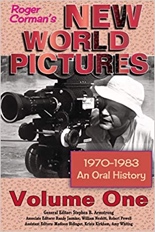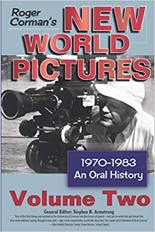
 Stephen B. Armstrong’s two volumes of Roger Corman’s New World Pictures (1970-1983): An Oral History are likely not what you think them to be, thanks to the “oral history” label. Today, we associate that term with a chronological narrative weaved together from quotes from varying sources, as one finds in untold numbers of internet articles and pop-culture books (e.g., I Want My MTV or Live From New York: The Complete, Uncensored History of Saturday Night Live).
Stephen B. Armstrong’s two volumes of Roger Corman’s New World Pictures (1970-1983): An Oral History are likely not what you think them to be, thanks to the “oral history” label. Today, we associate that term with a chronological narrative weaved together from quotes from varying sources, as one finds in untold numbers of internet articles and pop-culture books (e.g., I Want My MTV or Live From New York: The Complete, Uncensored History of Saturday Night Live).
What you get from Volume One and Volume Two, however, isn’t a story, but a collection of Q&A interviews (published by BearManor Media) separated by the interviewee and not presented in any order — other than starting with Roger, of course.
With that carp out of the way, know this: There are some great stories for the reader to discover within these interviews (and it’s kind of amazing how many made their way to Corman via Martin Scorsese). Jonathan Kaplan recalls getting one day’s notice to direct his first film, Night Call Nurses. Lewis Teague talks about his assignment to figure out how to get some sex and action scenes cut into Monte Hellman’s Cockfighter. John Sayles reveals eye-rolling details from the Piranha script he rewrote, such as the killer fish seeking menstruating swimmers.
 No one is more self-congratulatory than actor Martin Kove, while no one is more entertaining than actress Grace Zabriskie. It’s less about her #MeToo remembrance of Galaxy of Terror co-star Ray Walston and more about her blunt frustration and annoyance with the interviewer’s inquiries (“Dear God in heaven, I just can’t get interested in that question”), not to mention bafflement over why anyone wants to talk about Galaxy of Terror.
No one is more self-congratulatory than actor Martin Kove, while no one is more entertaining than actress Grace Zabriskie. It’s less about her #MeToo remembrance of Galaxy of Terror co-star Ray Walston and more about her blunt frustration and annoyance with the interviewer’s inquiries (“Dear God in heaven, I just can’t get interested in that question”), not to mention bafflement over why anyone wants to talk about Galaxy of Terror.
Others submitting to the hot seat include Sid Haig, Dick Miller (but just barely), Joe Dante, Allan Arkush, Mary Woronov, Robert Englund, Jack Hill and many more, several of whom are behind-the-camera personnel with names you won’t recognize. That’s not a bad thing, other than not always being properly introduced to the reader; in fact, I’d argue the single most informative conversation is with Corman attorney Barbara Doyle, who details her process for acquiring acclaimed foreign films for U.S. distribution, which gave Corman serious credibility to offset his miserly reputation.
On that note, a throughline emerges, with many acknowledging the low-as-possible budgets while also praising the flip side to that: real-world training and creative freedom. Not for nothing was the man awarded an honorary Oscar in 2009 … although it sure wasn’t for Galaxy of Terror. Armstrong makes sure to celebrate both, as one should! —Rod Lott
Get it at Amazon or BearManor Media.
